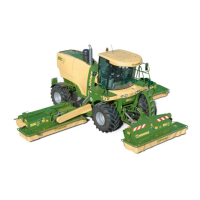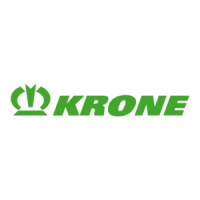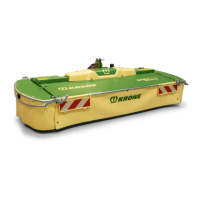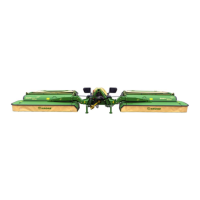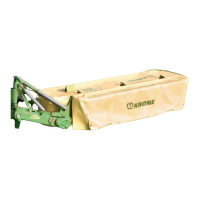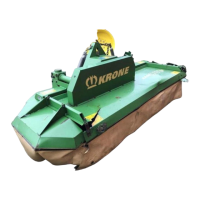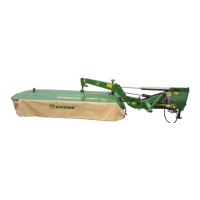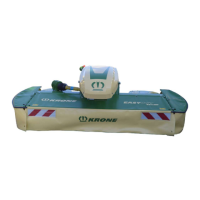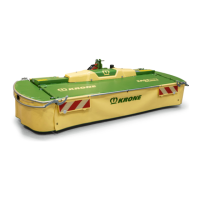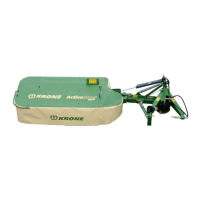Do you have a question about the Krone Big M II and is the answer not in the manual?
Describes the intended use of the Big M II self-propelled mower-conditioner for agricultural tasks.
Provides general details about the Big M II self-propelled mower-conditioner.
Lists the manufacturer's address and contact details for inquiries and support.
Details on how to identify the specific machine, crucial for service and parts.
Specifies the information required when contacting the manufacturer for questions or orders.
Outlines the authorized and intended uses of the self-propelled mower-conditioner.
Presents comprehensive technical specifications of the machine.
Provides specific technical data related to the mower components.
Explains how to recognize and understand safety instructions within the manual.
Details safety instructions and accident prevention regulations for safe operation.
Specific safety precautions for operating the self-propelled working machine.
Safety guidelines related to the use and handling of implements attached to the machine.
Safety measures and precautions for the hydraulic system.
Safety information concerning the machine's battery system.
Safety precautions related to the engine's cooling system.
Safety guidelines and checks for the machine's tyres.
Instructions on how to use emergency exit features and procedures.
Essential safety measures to follow during maintenance activities.
Safety considerations regarding unauthorized modifications and replacement parts.
Lists operations or modes that are forbidden to ensure safety.
Provides safety instructions specific to the machine's operation and use.
Illustrates the placement of various safety decals on the machine.
Explains the meaning and purpose of different safety decals found on the machine.
Continues the explanation of safety decals and their significance.
Further explanation of safety decals and their importance for operator safety.
Additional details on safety decals and their locations on the machine.
Provides further clarification on safety decals and their warnings.
Shows the placement of labels that provide general information about the machine.
Explains the content and purpose of general information labels on the machine.
An introductory overview of the machine's control interfaces and locations.
Details and identification of switches found on the control consoles.
Explains the functions and operation of the primary multifunction control lever.
Continues the explanation of the multifunction lever's various operational modes.
Further details on the multifunction lever's functions and adjustments.
Describes the switches located on the cabin's roof console.
Details the compartment and controls situated on the cabin's roof console.
Explains the controls and adjustments available on the steering column.
Operation and function of the switch for releasing the automotive drive.
How to operate the switch for separating the axles.
Guidance on using the road safety switch for compliant road travel.
Instructions for engaging and disengaging the parking brake.
Operation of the toggle switch for the windscreen wipers.
Operation of the toggle switch for the windscreen washer.
Details on operating the rotary switch for climate control.
How to use the ignition switch to start and stop the machine.
Information on activating the machine's horn.
Description of the various switches integrated into the multifunction handle.
Explains how the multifunction handle serves as the primary driving lever.
Explanation of the engine failure warning light and its implications.
Information on the alternator charging indicator light and related checks.
An overview of the Info Centre display and its basic functions.
Details the various functions and information available through the Info Centre.
Describes the information presented in the machine's information area.
Displays and explains information relevant during road driving conditions.
Information relevant to the machine's operation in field conditions.
Explains how to navigate through the machine's function areas and menus.
Details the options and settings available within the machine's settings menu.
Instructions for setting the overcut parameter.
Explains the function for controlling time or distance parameters.
Details how to finely adjust the time or distance control settings.
Describes the function key used to navigate to the next page of information.
Information on how to monitor the auger's performance.
Guidance on selecting language and measurement units (US, GB, Metric).
Procedure for selecting the preferred display language.
Explanation of the various meters and gauges displayed on the control panel.
Details on how the odometer function works and is displayed.
Information on the acreage meter and its readings.
Describes controls used for manual operation of machine components.
Instructions for manually operating the cutter bar.
Details on how to operate the fan reversal function.
Instructions for manual operation of the axle spring system.
Accessing and navigating the machine's service and diagnostic menu.
Explains the diagnostic functions available for troubleshooting.
Information on accessing Krone-Service specific functions or data.
Details on how system information is displayed.
Adjustments and settings available via the terminal interface.
How to operate the switch for dipped and full beam headlights.
Instructions for using the indicator switch for directional signals.
Explains the function of various indicator lights on the machine.
Location and function of indicator and side lights at the front of the machine.
Details on rear indicators, taillights, and brake lights.
Information regarding the number plate illumination system.
Operation of the work lights located on the cabin roof.
Operation of the work lights on the front side of the machine.
Operation of the work lights located at the rear of the machine.
Instructions for operating the warning beacon toggle switch.
Operation of the hazard warning lights toggle switch.
Instructions for safely accessing the driver's cabin via the ladder.
Steps for opening the cabin door from both inside and outside.
Guidance on adjusting the driver's seat for optimal comfort and ergonomics.
Details the features and adjustments of the air comfort seat.
How to adjust the lumbar support in the driver's seat.
Instructions for adjusting the position of the arm rest.
Specifies the location of the drink holder within the cabin.
Information on where to store the operating manual within the cabin.
Details regarding the passenger seat in the cabin.
Instructions for adjusting the steering wheel's height and tilt.
How to operate the parking brake for safe stopping.
Guidance on adjusting the cabin's sun blind.
Instructions for adjusting the cabin's inside mirror.
Details on the cigarette lighter and power socket locations.
Location and purpose of the diagnostics socket for service.
Information about the socket for connecting accessories.
Instructions for adjusting the right-hand side outside mirror.
Specifies the location of the emergency hammer for safety.
How to adjust the cabin's air nozzles for ventilation control.
A summary of daily checks to perform before operating the machine.
Guidance on checking and cleaning soil deposits in the engine bay.
Critical procedure for checking the engine oil level.
Critical procedure for checking the hydraulic oil level.
Procedure for checking the fuel level in the tank.
Instructions for checking the engine coolant level and condition.
Specific checks required after the machine has been stored for a long period.
Guidelines for inspecting tyres for wear, damage, and pressure.
Checks to be performed on the cabin before starting operation.
Procedure for the initial running-in period of the engine.
Essential conditions and checks required before starting the engine.
Steps to activate the electrical circuit for the machine's electronics.
Procedure for switching on the ignition before starting the engine.
Detailed steps for safely starting the machine's engine.
Explanation of the engine oil pressure indicator light.
Instructions for starting the engine using an auxiliary battery.
Procedure for safely stopping the machine's engine.
Instructions on how to properly shut down and kill the engine.
Specific considerations and procedures for operating the engine in cold conditions.
Basic rules and principles for driving the machine safely.
Information and procedures for operating the machine's brake system.
Steps required to disengage the parking brake.
Details on the function and use of the road safety switch.
How to adjust the machine's acceleration characteristics.
Instructions for driving the machine forwards and in reverse.
Further guidance on driving the machine forwards and backwards.
Measures to prevent overheating of the hydrostat system.
Important information and regulations related to transporting the machine.
Steps to prepare the machine for transport.
Procedure for emergency disengagement of the parking brake.
Guidelines for the correct and safe use of the mower units.
Instructions on how to adjust the mower units for optimal performance.
Safety precautions to be observed during mower adjustments.
Information on the function and maintenance of mower guards.
Procedure for setting the cutting height of the mower units.
Instructions for adjusting the ground pressure of the mower units.
Further details on setting the ground pressure for mower units.
How to adjust the speed of the conditioner unit.
Details on adjusting the cover plate of the front mower conditioner.
Specific adjustments for the conditioner cover plate on Big M CV models.
Instructions for setting up the optional roller conditioner.
Guidance on adjusting the spacing of the conditioner rollers.
How to adjust the swath width for the mower output.
Specifics on adjusting the swath width for the front mower.
Specifics on adjusting the swath width for the side mowers.
Instructions for setting the transverse link on side mower units.
Information on inspecting and maintaining front mower guiding plates.
Crucial safety guidelines to follow during all mower maintenance tasks.
General procedures and checks applicable to mower maintenance.
Step-by-step guide for greasing the universal joint shaft.
Specifies lubricant types and quantities required for gearboxes.
Information on checking gearbox oil levels and recommended change intervals.
Maintenance procedures for the main gearbox and side mower.
Maintenance for the angular drive and front mower components.
Maintenance procedures for the input gearbox on front mowers.
Maintenance for the 2-speed gearbox on front mowers.
Procedure for checking cutterbar oil level and performing oil changes.
Detailed instructions for changing the blades on the cutterbars.
Essential safety precautions to take when changing mower blades.
Guidance on checking the condition of blades and their securing pins.
Specific checks for blades on cutter discs with screw connections.
Specific checks for blades on cutter discs with quick-release mechanisms.
Procedure for changing blades on cutter discs with screw connections.
Procedure for changing blades on cutter discs with quick-release systems.
Instructions for replacing the lining of the cutterbar.
Maintenance procedures for the conditioner belt drive system.
Lubrication schedule and points for the front mower.
Lubrication schedule and points for the side mowers.
Steps for installing the auger-type cross conveyor.
Procedure for removing the conditioner deflector plate.
Instructions on how to release the clamping levers.
Details on removing the conditioning deflector plate.
Procedure for removing protective guards from the machine.
Steps for correctly installing the auger-type cross conveyor.
Instructions on how to lock the clamping levers securely.
Procedure for tensioning the V-belts on the machine.
Instructions for installing protective guards.
Procedure for connecting the speed sensor to the machine.
Instructions for removing the floor plates from the machine.
Steps to activate the auger monitoring mode via the Info Centre.
Process for converting the machine from cross feeding to wide spreading mode.
Guidance on checking and cleaning soil deposits in the engine bay.
Critical procedure for checking the engine oil level.
Detailed steps for replacing the engine oil and oil filter.
Instructions for replacing the fuel filter assembly.
Procedure for replacing the fuel filter element.
Important safety precautions and information regarding fuel.
Step-by-step instructions for safely filling the fuel tank.
Procedure for checking the fuel level using the gauge.
Specific checks for the fuel system after extended storage.
Details about the type and specifications of engine coolant used.
Procedure for checking and topping up engine coolant.
General maintenance procedures for the hydraulic system.
Safety warning regarding potential leaks in hydraulic lines.
Overview of the hydraulic system's operating principles.
Details on the hydraulic pumps used in the system.
Information about the main hydraulic block and its components.
Explains the function of adjustable throttles for speed control.
List of recommended hydraulic oils and their specifications.
Procedure for checking the hydraulic oil level.
Detailed instructions for replacing the hydraulic oil filter.
Maintenance of the oil in the distribution transmission.
Information on the windscreen washer system's operation.
Guidance on checking and maintaining the machine's tyres.
Instructions for correctly fitting tyres onto the wheels.
Steps for securing wheels to the machine, including torque specifications.
Overview of the electrical system's key specifications.
Procedures for maintaining the machine's batteries.
How to operate the main battery disconnect switch.
Highlights the dangers associated with batteries and necessary safety precautions.
Instructions for cleaning the battery terminals and casing.
Procedure for checking the electrolyte acid level in the battery.
How to measure the specific gravity of the battery acid.
Correct procedures for installing batteries and connecting poles.
Maintenance procedures for the vehicle's alternator.
Maintenance and troubleshooting for the starter motor.
Identifies the location and function of fuses in the control box.
Details on fuses and LEDs for the Krone-Machine-Controller (KMC 1).
Diagram showing the electrical layout within the Big M II cabin.
Lists fuses and relays specific to the cabin's electrical systems.
Details on LEDs and relays for the first sub-distributor.
Lists fuses for the first sub-distributor unit.
Continued details on LEDs and relays for the first sub-distributor.
Lists fuses for the second sub-distributor unit.
Details on LEDs and relays for the second sub-distributor.
Troubleshooting guide for error codes related to the KMC1.
Further error codes and their remedies for the KMC1.
Troubleshooting guide for error codes generated by the SmartDrive system.
Additional SmartDrive error codes and their troubleshooting steps.
Safety instructions for performing maintenance on the HVAC system.
Identification and description of the air conditioning system's components.
Technical data and safety information for R 134a coolant.
Technical specifications for the air conditioning and heating system.
Details on the air intake and distribution pathways within the cabin.
Procedures and safety precautions for handling machine coolant.
Explanation of the pressure switch's function in the HVAC system.
Guidance on checking and maintaining the cabin's fresh air filter.
Information on the role and function of the collector/drier.
Procedure for checking and filling the coolant level.
Instructions for inspecting and cleaning the air conditioning condenser.
Essential steps for storing the machine at the end of the harvest season.
Specific procedures for storing the engine during the off-season.
Tasks required to prepare the machine for operation at the start of a new season.
Maintenance and adjustment procedures for the ventilation wheel drive belt.
Maintenance for the drive belt on the deployment arms.
Details on the drive belt system for the mower units.
Maintenance and adjustment for the drive belts on the side mowers.
Maintenance tasks to be performed during the machine's running-in period.
Scheduled maintenance checks and lubrication every 10 operating hours.
Specific maintenance tasks to be completed after the first 10 operating hours.
Scheduled maintenance after the first 100 operating hours.
Scheduled maintenance checks and lubrication every 250 operating hours.
Scheduled maintenance and lubrication every 500 operating hours.
Scheduled maintenance and lubrication every 1500 operating hours.
Maintenance tasks to be performed as needed, based on inspection.
Maintenance procedures to be carried out annually.
Maintenance procedures to be carried out every two years.
A comprehensive chart detailing lubrication points and intervals for the machine.
Instructions for installing the guard cloths on the mowing units.
| Brand | Krone |
|---|---|
| Model | Big M II |
| Category | Lawn Mower |
| Language | English |
